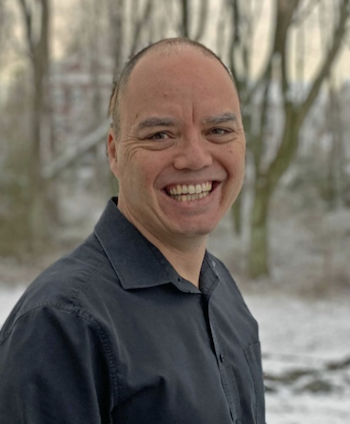The most eye-opening aspect was simply the monumental impact cognition has on every aspect of our lives from micro-interactions and decisions to [those] involving huge masses of people.
— Deanna Smith, Honors College sociology major
“Prior to COVID-19 taking over the world, climate change was a very big issue — and it’s still a big issue,” explains Dr. Davis Kuykendall.
On April 6th and 8th, Dr. Kuykendall invited climate scientists Dr. Miriam Jones and Dr. John Cook to his virtual class to talk about the technicalities of collecting evidence and the breadth of scientific support on the fact of anthropogenic, or human-caused, climate change.
“Students are way younger than the rest of us, so they’re going to be more impacted by the public being misinformed about the states of various sciences and the suggestions of scientists, rather than their parents’ or grandparents’ generation,” continues Dr. Kuykendall.
His HNRS 360: Scientific Controversies class is about the intersection between philosophy and science, more specifically, how scientific experts determine what is fact through consensus. Students in the class are tasked with group research projects to discover and highlight scientific controversies and how their coverage has informed or misinformed the public.
As a faculty member in the Philosophy Department, Dr. Kuykendall “wanted the students to learn some basic philosophy of science, basic logical and critical thinking skills, and some cognitive psychology, and apply those three topics towards scientific controversies,” both genuine and ‘fake.’
Sociology major Deanna Smith was surprised at how heavy a role logic and human cognition play in determining individual and public mindsets: “I especially wasn’t expecting the frustrating difficulty of consciously changing our mindsets, even after our cognitive biases and irrational ideas have been made apparent.”

Dr. Miriam Jones and co-worker light fire to methane gas released from a permafrost lake. Photo courtesy of Dr. Jones.
The first guest lecturer, Dr. Miriam Jones, is a U.S. Geological Survey research paleogeologist whose work on permafrost thaws has introduced new insight to the uncertainties of climate change tipping points. According to her recent study published in the journal Nature, current climate models substantially underestimate the carbon and methane emissions released from thawing permafrost. Its estimated that there is twice as much carbon in permafrost than currently in the atmosphere. Because the arctic is rapidly heating, permafrost thaw is rising in concern. It has the potential to reinforce warming in a positive feedback loop, should global temperature rise continue to accelerate.
In her web lecture, Dr. Jones outlined the scientific background for climate change, including climate controls, inputs, feedbacks, and proxies for temperature change throughout geological history. This included a comparison between atmospheric carbon dioxide levels now and in the mid Pliocene epoch (5.3 to 2.6 million years ago), which was the last time in our history that the earth has experienced emissions over 400 parts per million (ppm).
“[Her] lecture’s implications, along with the reading assigned by Dr. Kuykendall for that week, had a much more emotional (fearful, really) impact [on me.] Her use of such a wide variety of proven examples or study cases […] really opened my eyes that climate change should be taken even more seriously than it is in some scientific circles now,” notes Smith.
The second web lecturer, Dr. John Cook, is one of the prominent researchers on proving consensus in climate science. He is a resident expert at Mason’s Center for Climate Change Communication on scientific misinformation and is cited with determining that there is at least 97 percent consensus among climate scientists regarding anthropogenic climate change. His peer-reviewed study from 2013 has been lauded widely among scientists, news outlets, and even former President Barack Obama.

Center for Climate Change Communication researcher Dr. John Cook. Photo courtesy of Dr. Cook.
His web lecture presented the many logical fallacies and cognitive biases involved in climate change denialism, which he also explores on his website Skeptical Science.
One important point of Dr. Cook’s talk was that recognizing a fallacy “can help show people how to identify a scientific controversy, preventing them from believing false information,” recalls Environmental Science major Charlotte Joannidis.
“The most eye-opening aspect was simply the monumental impact cognition has on every aspect of our lives from micro-interactions and decisions to [those] involving huge masses of people,” says Smith.
HNRS 360 students in attendance learned both about the implications and realities of researching climate change and how they can help change the false discourse surrounding its occurrence.
Joannidis gained a fresh perspective on addressing issues important to her. “I have never thought about what the best way to approach people who do not think that there is a scientific consensus about climate change was, until listening to John Cook's talk. I liked how he has created a website with articles, videos, and cartoons that help break down climate myths, so that people can better understand why they are myths.”
Smith also left the lectures feeling compelled to make a difference: “[I] have this moral imperative,” she says.
Dr. Kuykendall’s HNRS 360: Scientific Controversies will be offered in the Spring 2021 semester.
